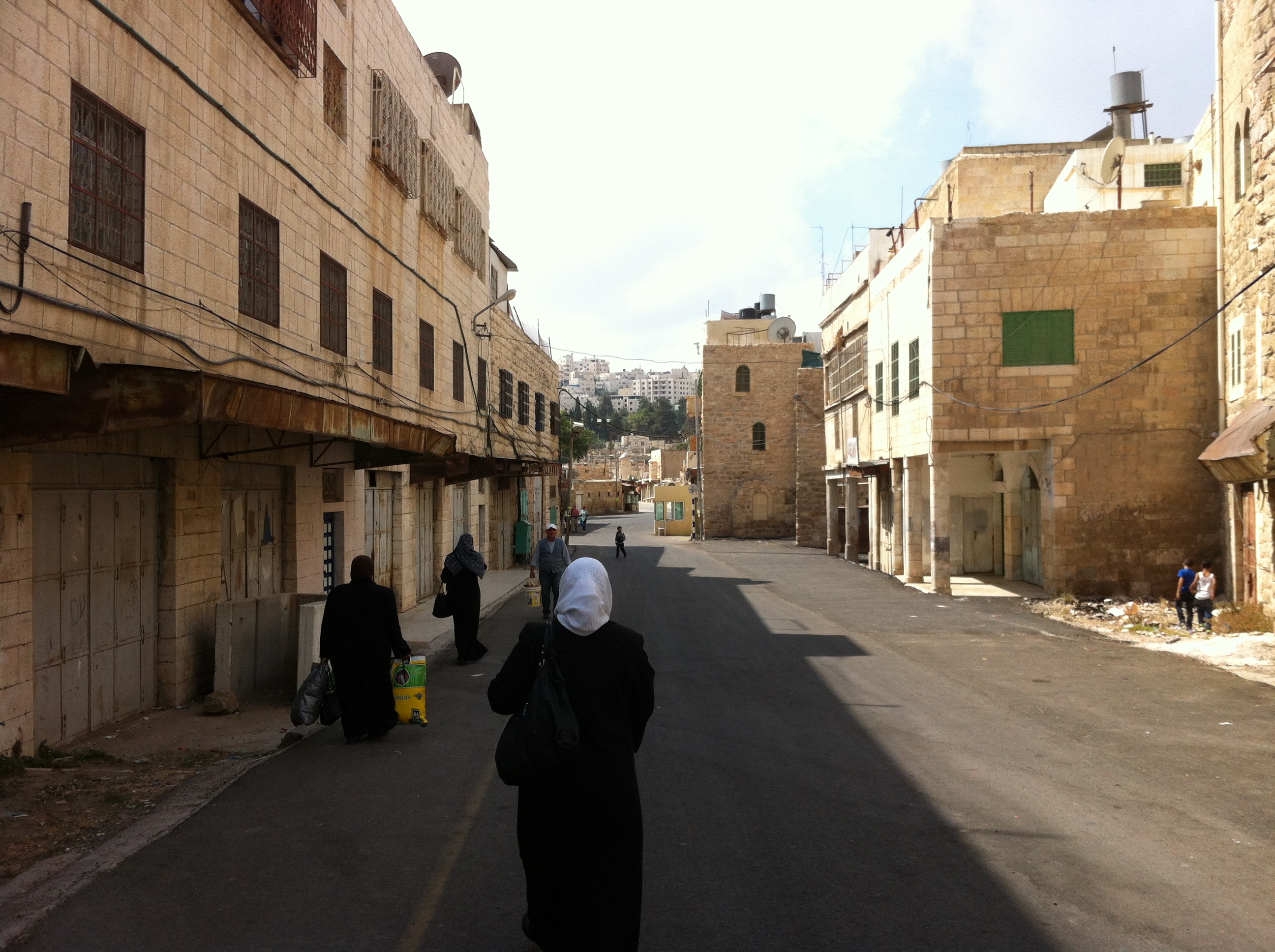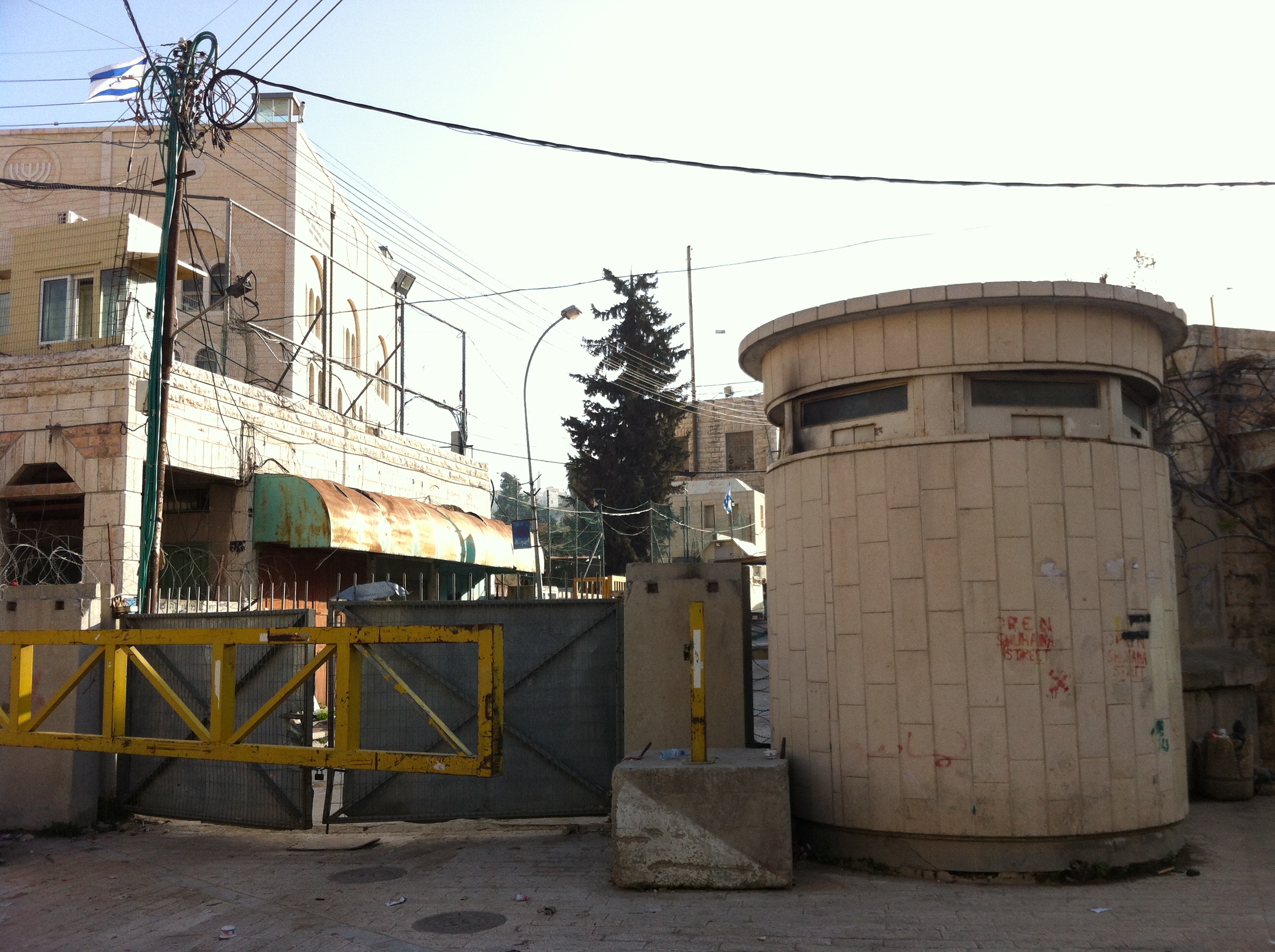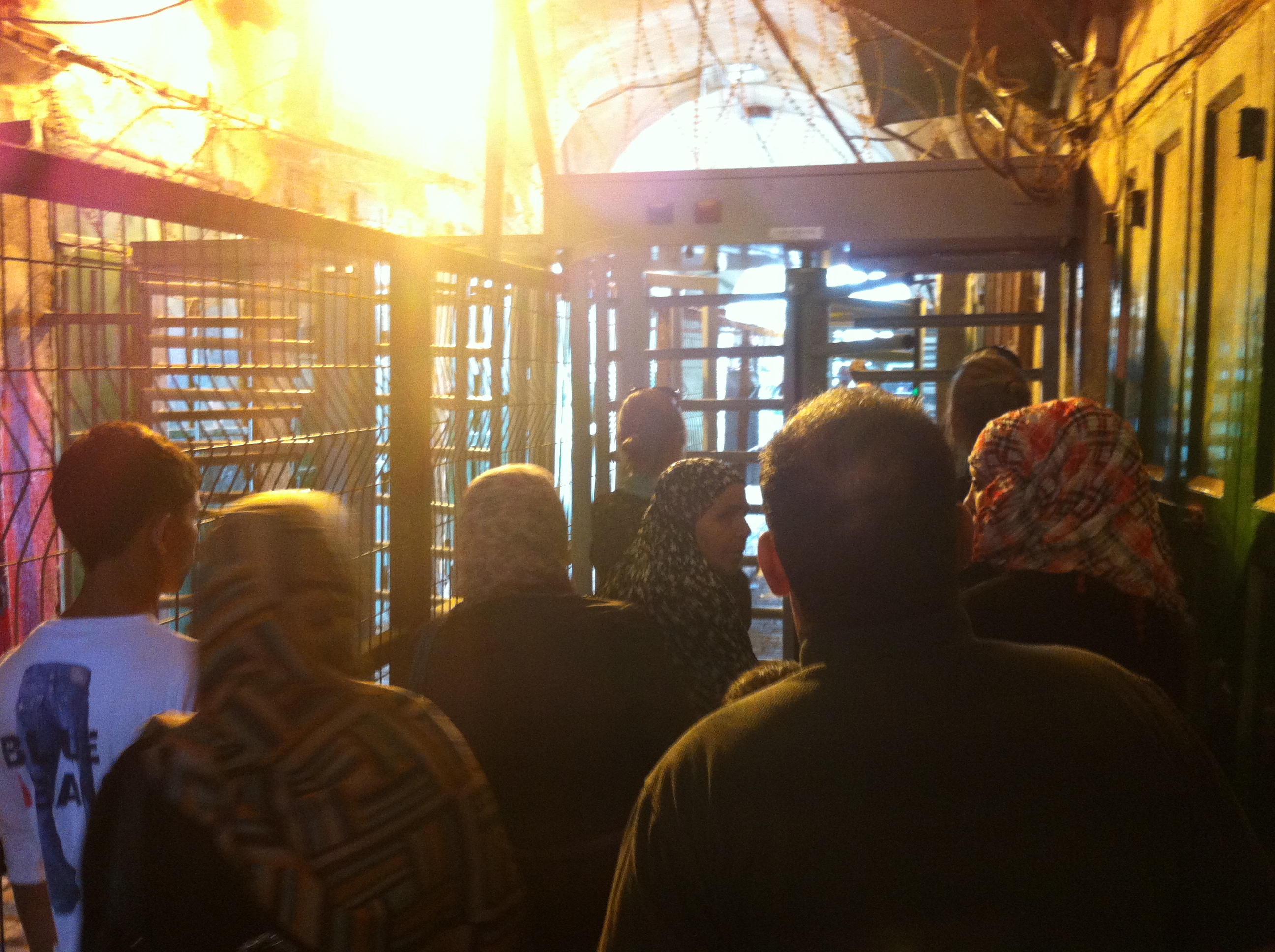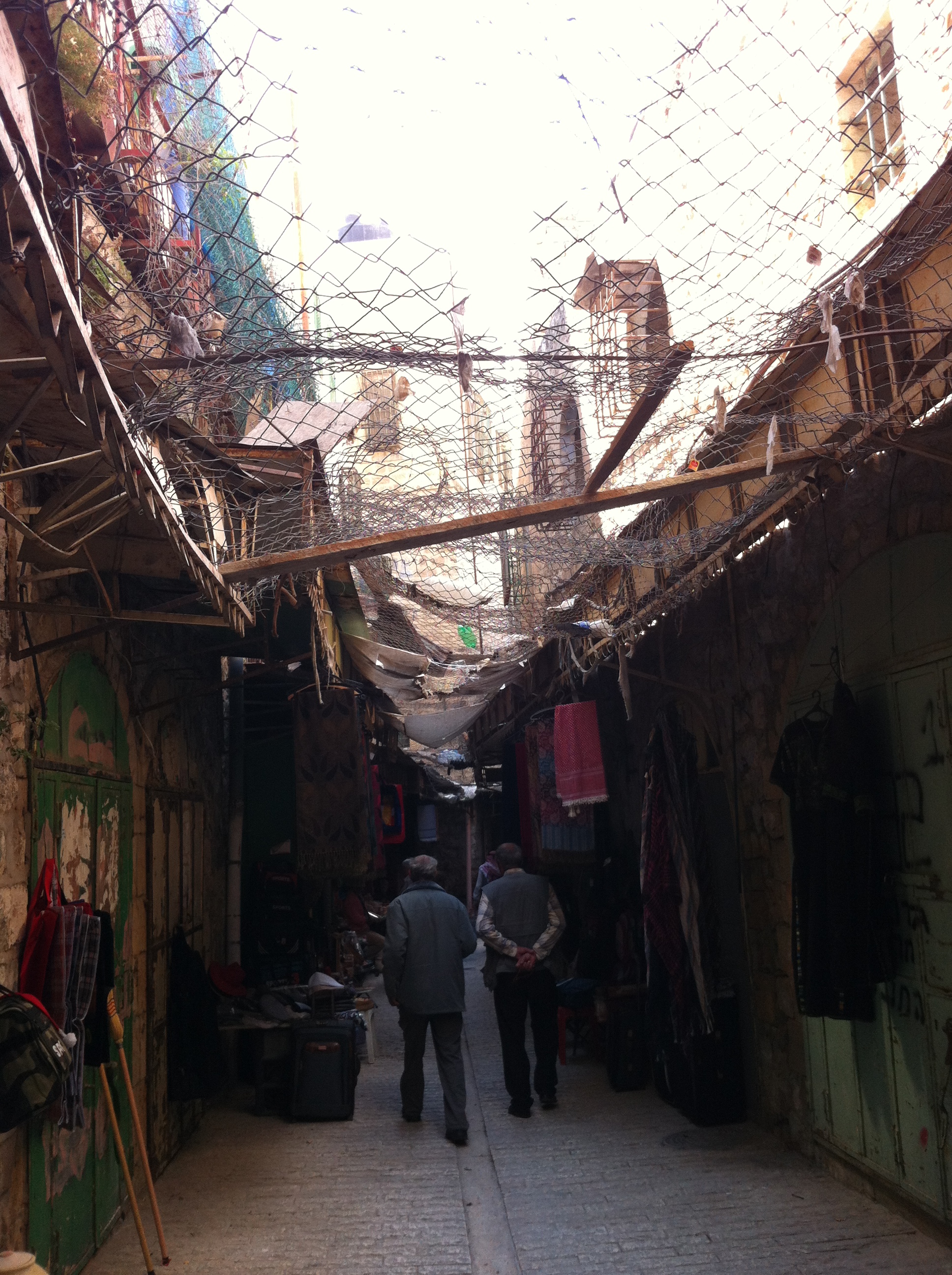Originally published by Ma’an News Agency on November 19, 2014.

This is the first part in a series about the lives of Palestinian women affected by the Jewish settlements of Hebron’s Old City. Read the second part here.
Having grown up in Hebron’s Old City, Aisha was used to dealing with Israeli soldiers and their questions on a daily basis. When she was a little girl the checkpoints began multiplying as the Jewish settlements expanded throughout the city, and by the time she reached middle school she had to pass through a checkpoint to go anywhere more than a few meters up the road.
The staring, the yelling, and the pushing were a daily occurrence, and she says that more than a few times young Jewish settlers who had taken over homes in the area smacked her as she passed while soldiers watched impassively. For a girl growing up in Hebron’s Old City, these little humiliations were — and are — the stuff of life.
But even Aisha was surprised the day a female soldier locked her into a small compartment near the checkpoint under the pretext of “inspection” while she was on her way back from school. The soldiers at the checkpoints see the same neighborhood kids pass back and forth on their way to school every day, and often know them by name. When the gun-toting Israeli decided to inspect her all of a sudden, Aisha began to worry.
“The room was scary and terrible,” Aisha told Ma’an during an interview at her Hebron home. But after the soldiers yelled at her to sit and wait in the room, she did as she was told. Aisha grew up seeing children as young as five detained for throwing stones in self-defense — to say nothing of the hundreds of grown women and men who were taken away after trying to hit back — and she knew that resistance could land her in a cell somewhere deep in Israel, where visits from her family, unable to leave the West Bank, would be impossible.
After sitting in the dark room for a few moments, waiting for the inspection to begin, Aisha’s fears turned to horror.
“A male Israeli soldier entered the room and told me: ‘Take off your veil and your clothes, and raise your trousers,'” Aisha whispered as she recounted the story, eyes downcast as she sat speaking with Ma’an in her small family room in Old Hebron.
Even if she wasn’t allowed to fight back, however, Aisha refused to submit, and she told the soldier she would never do as he said unless he left and the female soldier carried out the inspection. The soldier left angrily, locking her in the dark compartment for hours. But at long last, a female soldier came and carried out the strip-search, and Aisha was released.
Aisha’s experience is far from rare in Hebron. More than anywhere else in the West Bank, the 47-year-old Israeli occupation can be seen at its worst in the cobblestone alleyways of the Old City. Here, Jewish settlers take over individual buildings in order to construct colonies, working room by room to evict locals by harassing them at gunpoint and with rocks.
The approximately 600 settlers are protected by thousands of Israeli soldiers against local population that has been reduced to just a few thousand after years of abuse. The soldiers support the work of settlers by blocking off streets to Palestinian traffic and harassing the families that refuse to leave, making normal life an impossibility in the areas settlers have targeted for expansion.
For a young woman trying to go to school, the barriers can be almost insurmountable. Eighteen-year-old Ghadir, who lives two alleys over from Aisha in the Old City, told Ma’an that the soldiers at the checkpoint would regularly stop her on her way to and from middle school. They would keep her for “inspection” for what seemed like completely arbitrary amounts of time, ranging from 30 minutes to several hours, and would get mad at her if they found a ruler or any other item they alleged could be used as a weapon against them.
She said that the worst, however, was when the soldiers would sexually harass her as she walked, taunting her with remarks on her physical appearance.
“I go to school by myself, I have no friends here in the neighborhood, and my brothers were too young (to protect me),” Ghadir told Ma’an, with resignation in her voice.”I usually ignore their abuse, and when they see that I am ignoring them, they force me to stand in the sun for hours,” she added, referring to the many times she says she has been detained and kept outside for no reason.


Ghadir never told her parents about the abuse she faced to and from school, but after being held for extended periods of time and coming home with bruises from Jewish settlers who hit her as they passed her in the streets, she told Ma’an that they began to understand. As a result, when she was only 13 her father took her out of school, arguing that she should not have to put up with the treatment of the Israelis anymore. Knowledge of the daily harassment she faced was too much for her family to bear, but the price was young Ghadir’s access to education.
An Israeli military spokesperson contacted for this article told Ma’an that there are “clear regulations regarding security checks,” and that “it is forbidden for IDF soldiers to make any physical contact with Palestinian women.” Strip-searches are presumably not covered by this policy, however, and neither is verbal sexual harassment.
Although Palestinians can file a complaint at the Hebron police station or through the Israeli military’s District Coordination and Liaison Office, the military spokeswoman told Ma’an that only one woman had ever sued for sexual harassment. But the spokeswoman claimed that this woman had “attempted to jump the fence” near the Ibrahimi Mosque in Hebron and thus the physical search she was subjected to by soldiers was deemed to be warranted.
Despite the possibility of filing a complaint, when the chances of victory against the Israeli military are slim and the Israeli soldiers harassing you know you personally and see you everyday, it is difficult to imagine anyone successfully taking such a case to court. In Hebron’s Old City, the barriers put up to women’s presence in the public sphere and their ability to receive an education cannot be solved by one-off sexual harassment prosecutions against soldiers, but are part of the very structure of the Israeli occupation’s control over Palestinian lives, bodies, and cities.
For Ghadir, the abuse did not end after she quit school. In January of this year, Jewish settlers began entering her family’s home at all hours of the night, armed with rifles. The settlers broke a hole into the wall of an adjacent empty room, and since that time they walk in multiple times a day, often with Israeli military escorts, Ghadir told Ma’an. Ghadir said she wished she could return to school, but sees no chance of it any longer.”
My family will not allow me to study in a school near the Israeli checkpoints,” she said. “They will not allow me to face the same exact things I used to face five years ago.”Given that the harassment she once faced on the street has now come in to her very home, it is difficult to imagine that happening any time soon.
The second part of the series on Palestinian women affected by the Jewish settlements of Hebron’s Old City will focus on the lives of families targeted by daily home invasions intended to force them from their homes. Read it here.
